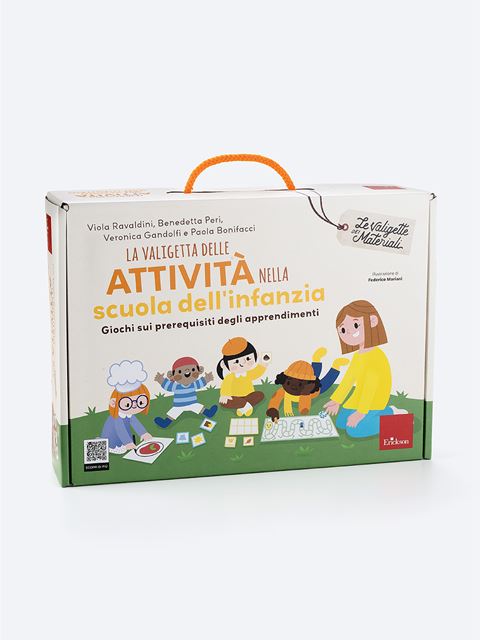 EN
EN
 PT
PT
Games to develop early learning skills

Product: Teaching tools
ISBN: 9788859041856
Publication date: 01/03/2025
Suitable for: Nursery 1st Level (ages 3-4), Nursery 2nd Level (ages 4-5)
REQUEST A SAMPLE OR MORE INFORMATION
A case packed with engaging tools designed to support early learning in preschool children through play! Featuring visual materials and interactive activities, it helps young learners develop attention, memory, language, and social skills while also promoting inclusion, including in bilingual settings.
The case includes four main games, themed around the seasons, offering playful and educational experiences adaptable to different ages and skill levels.
Teaching objectives
• "10 Feet" Game Board
• Tokens and Playing Piece
• 6 Decks of Cards (sequencing, categories, colours, number/quantity, executive functions, bingo/memory)
• 3 Dice
• 14 Bingo Boards
• Bingo Riddle and Sentence Cards
• Number Line, Syllable Meter, Treasure Chest, Lock, and Paddle Cards
• "Story Mountain" Game Board

To understand and manage emotions, thoughts and behaviours
Raffaella Baldino

A toolkit full of resources designed to support learning through play for children aged 3 to 6 attending kindergarten. This resource offers a variety of engaging activities aimed at strengthening key pre-reading, pre-writing, and early numeracy skills, while also developing important executive functions such as attention, memory, and planning.
The box contents

6 decks of cards

3 dice

Paper sheets for activities

"10 Feet" Game Board

"Story Mountain" Game Board

Tokens
How to play
Inside the kit, you’ll find four main games themed around the seasons, which can be adapted to suit different ages and ability levels:
The morphosyntactic bingo

Each child receives a board with pictures; the adult reads out sentences describing the images, and the children must identify and cover the corresponding image on their own board. Objective: to stimulate listening skills and language comprehension.
The 10Feet Game

Children roll a die and must build the number shown using coloured feet pieces. Objective: to support counting skills and the understanding of quantity–number correspondence.
The Invent-a-Dish Kitchen

Children draw cards with ingredients, actions, and utensils, then invent their own recipe. Objective: to stimulate storytelling and enrich language skills.
The Treasure Hunt

Following clues, children search for objects or complete small challenges. Objective: to develop memory, attention, and problem-solving skills.
Each game can be easily included in teaching plans. For each game, the following details are provided:
For every game, alternative activities are also suggested, using the materials provided in the kit.
Leaf through some selected pages from the instruction book that have been translated into English to facilitate your evaluation:
The Authors
Viola Ravaldini, Psychologist and Psychotherapist. She focuses on cognitive processes and neurodevelopmental disorders, with particular attention to the role of individual and environmental factors in developmental trajectories during childhood and adolescence.
Benedetta Peri, Psychologist, specialises in learning processes and disorders, with a specific focus on numerical cognition in both typical and atypical development. Veronica Gandolfi, Psychologist, works in the field of child development, serves as a school psychologist, and carries out psychodiagnostic assessments. Paola Bonifacci, Psychologist and Psychotherapist, is Associate Professor in the Department of Psychology at the University of Bologna.